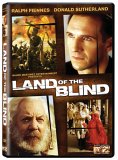| Reviews & Columns |
|
Reviews DVD TV on DVD Blu-ray 4K UHD International DVDs In Theaters Reviews by Studio Video Games Features Collector Series DVDs Easter Egg Database Interviews DVD Talk Radio Feature Articles Columns Anime Talk DVD Savant Horror DVDs The M.O.D. Squad Art House HD Talk Silent DVD
|
DVD Talk Forum |
|
|
| Resources |
|
DVD Price Search Customer Service #'s RCE Info Links |
|
Columns
|
|
|
Land of the Blind
Absolutely power corrupts absolutely good movie concepts
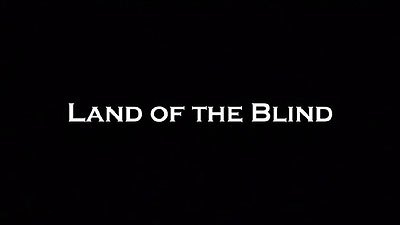
Reviewer's Bias*
Loves:
Likes: Ralph Fiennes, Donald Sutherland
Dislikes: Lara Flynn Boyle, dystopia
Hates: Politics
The Movie
Here in 2006, politics have lost a lot of the humorous touches that have powered "Saturday Night Live" and satirical films like Dick and Three Kings. A movie like American Dreamz should have been a great skewering of the political malaise in America, but it didn't work. It might be because politics, the ones behind the nuclear threats worldwide, the Middle-East crises and similar nightmares, are scarier now, and harder to laugh about. That might be the reason why Land of the Blind, which satirizesfascism while attempting to send a message about the dangers of power, doesn't quite work.
Joe (Ralph Fiennes) is a prison guard working under the regime of Maximilian (Tom Hollander, Pirates of the Caribbean: Dead Man's Chest), a Napoleonic man with a love of craptacular action films, who took over after the death of his totalitarian father, a man who ran the country with an iron fist. Max, known popularly as "Junior," is more interested in directing his bad movies, meeting celebrities (like his movie-star wife (Lara Flynn Boyle)) and killing people, than running a country. Under his rule, the most dangerous weapon is thought, which is why Thorne (Donald Sutherland) is in prison. A revolutionary embraced by the people, Thorne is watched over by Joe, who falls under the sway of his influential ramblings, which he scribbles on his cell walls in his own feces.
With Joe's help, Thorne takes over the government, and a utopian society develops where everyone lives happily ever after. The end.
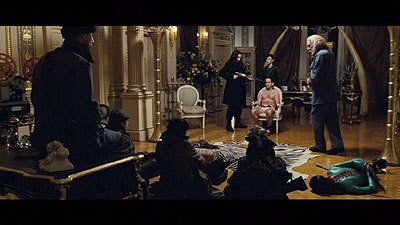
Obviously, that's not the case, but it would have been more believable than the second half of this plot. Thorne's government is actually much more controlling and fascist than Junior's, with a definite Islamic tone to it, seen in the treatment of women. The change from thoughtful prisoner to oppressive dictator is so sudden that it is a bit overwhelming, and makes little sense in relation to the rest of the film. There's a definite out-there bent to the film, most obvious in the ridiculous, commercial-ridden newscasts used to show where society stands, but it's not bizarre enough to make Thorne's schizophrenic mindset work in the grand scheme of the movie.
Though the film has a good deal of humorous touches as a part of the satire, especially in the depiction of Junior's reign, once Thorne takes the throne, it's all depression, all the time. Joe becomes a stand-in for civilization as a whole, and suffers non-stop until the credits roll. There are plenty of times where you're begging for something to change, for a bit of hope, but the film charges ahead into a darker future that wraps up in a confusing "twist" ending that may not have been a twist. By the time I got there, I really didn't care after having my spirit beaten down so long.
Though the story wasn't quite right, the film has an attractive look to it, making good use of stock footage and different video treatments, to create a hyper-realistic feel. There are some interesting sets and a few scenes that are visually intriguing, but they don't add up to a cohesive production. It feels like Robert Edwards, who has been a documentary filmmaker, was influenced by the dystopian classics that came before, and those influences made the movie into a quilt of styles and techniques. Perhaps if the film had a more dominant voice and tone, the story would have worked, but it comes off as a heavy-handed parable about the perils of power, and less an interesting movie.
(It's interesting to note that this film doesn't have many parallels to the current Bush administration, when most would expect them from a recent political satire. The cowboy/frat boy attitude of Maximilian is about as close as it gets, and even that's a stretch.)
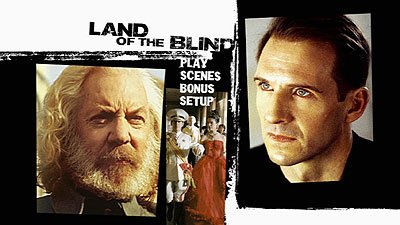
The DVD
Packaged in a standard, insert-less keepcase, with an embossed slipcover that repeats the cover art, this is a one-disc release featuring a static, anamorphic widescreen main menu. The menu offers a choice of playing the film, selecting scenes, viewing the extras and adjusting the set-up. Audio options include English Dolby Digital 5.1 and 2.0 tracks, but there are no subtitles and no closed captioning.
The Quality
The 2.35:1 anamorphic widescreen transfer looks very clean, without any obvious dirt or damage. The disc does a nice job of portraying the wide variety of looks and color schemes, with a minimum of grain evident and no annoying haloing or pixelation. Colors are appropriately displayed, whether bright (as seen in the palace shots) or dull and grimy (in the prisons.) There's a good deal of interesting visuals, and they are well-reproduced here.
The Dolby Digital 5.1 soundtrack is sufficiently active for a film with a modicum of action, while the dialogue is crisp and clear. Much of the film is strictly about conversations, which doesn't make for a dynamic presentation.
The Extras
"Anatomy of a Thriller" is a pretty good studio-style making-of featurette that takes a look at the film's development and the rise of writer/director Robert Edwards. At 10 minutes, it doesn't outstay its welcome, and gives a good peek behind the production, with comments from Fiennes and Hollander, and some joking from Boyle.
Also found on the DVD are the film's theatrical trailer (which is a well-crafted preview), and the trailer for Ed Burns' new flick, The Groomsmen.
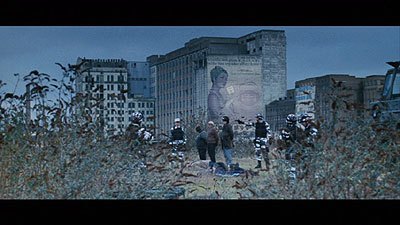
The Bottom Line
In concept, Land of the Blind is very good, but it's also been done before. In execution, it's flawed and uneven, which could have been solved by letting go of reality and going broader with the concept than it did. As a result, what we are left with is a familiar story that doesn't offer much more than its predecessors. It's hard to do anything new with the THX-1138/Brazilfascist -state idea, especially when you attempt to add a moral to the story. The DVD does a nice job of presenting the film, though the extras are lacking, considering the opportunities for expanding on the ideas. It's certainly not a bad movie, but it's not a film that will find a permanent spot on your shelf.
Francis Rizzo III is a native Long Islander, where he works in academia. In his spare time, he enjoys watching hockey, writing and spending time with his wife, daughter and puppy.Follow him on Twitter
*The Reviewer's Bias section is an attempt to help readers use the review to its best effect. By knowing where the reviewer's biases lie on the film's subject matter, one can read the review with the right mindset.
|
| Popular Reviews |
| Sponsored Links |
|
|
| Sponsored Links |
|
|
| Release List | Reviews | Shop | Newsletter | Forum | DVD Giveaways | Blu-Ray | Advertise |
|
Copyright 2024 DVDTalk.com All Rights Reserved. Legal Info, Privacy Policy, Terms of Use,
Manage Preferences,
Your Privacy Choices | |||||||









